Marketing and Engagement Insights for Each Stage of International Student Journey
Are you a recruiter or marketer from a higher education institution looking to develop a thorough understanding of the international student journey? You’ve come to the right place! We at educations.com have compiled this guide to help you market your institutions effectively and engage with your students and alumni at every stage of the journey.
By understanding the complete international student journey, you will be able to successfully:
-
generate student leads,
-
develop long-lasting relationships with your students and alumni, and
-
convert your alumni into powerful advocates.
A common misconception about the international student journey is that it is a straightforward journey that begins at the awareness phase and ends at the enrollment phase. Our extensive experience in helping prospective students find the most relevant information on study abroad options has led us to understand that the international student journey is longer and more complex than that.
The comprehensive international student journey consists of the following phases:
Read on to learn more about each phase and take away key marketing and engagement insights at each stage.
The estimated timeline for each phase is not fixed. The timelines will differ for different programs, schools and countries, and individual students’ circumstances.

PHASE I. AWARENESS: 6 Months to 2 Years or More Before Start Date
Students begin to seriously consider the possibility of studying abroad at the awareness phase.
The length of time of the program (for example, a 3-year bachelor’s degree versus a semester-length exchange program) as well as the cost of studying abroad are two key factors that affect how far in advance students would think about studying internationally.
A survey by Research Stories shows that more than a fifth of international students in the United Kingdom start thinking seriously about studying internationally more than two years in advance. This indicates that the decision to study abroad is frequently a long and complex one.
Universities and schools should strive to become students’ natural first choice by capturing student interest early!
Stage 1: Would I like to study abroad?
At this stage, prospective students are beginning to consider international education as a distinct possibility. Their interest may have been piqued by their family and friends, peers, teachers at schools, opportunities at university or professional experiences in the workplace.
It is helpful for recruiters to know the top motivators for students to study overseas. educations.com’s International Higher Education Survey: Student Insights 2020 reveals that prospective students’ top reasons for studying abroad are both career/education-driven (to achieve my career goals, to access higher quality teaching) and experiential (to experience a new culture / lifestyle, to develop myself personally).
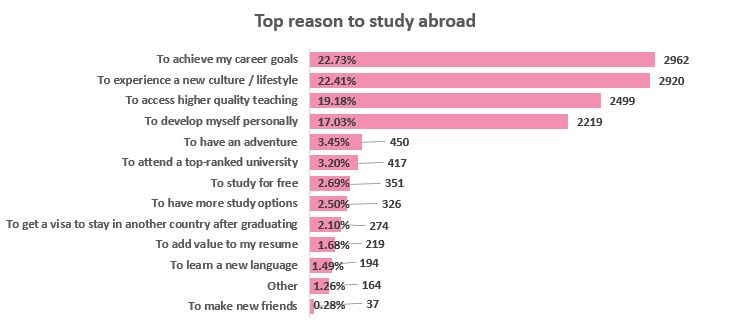
Marketing insights for recruiters💡
➡️ Plan to build brand awareness of your institution at least 2 or 3 student intakes ahead. Many of your awareness-level marketing initiatives will show ROI only after a longer period of time, so be careful about taking measurements surrounding enrollment too early and instead focus on engagement goals.
➡️ Highlight the benefits of studying abroad that are related to students’ top motivators. Weave in how your institution can contribute to students’ goals of international education.
➡️ Sponsor awareness-level content or create your own content.
➡️ Work with school counsellors to generate interest in studying abroad.
➡️ Develop a peer-to-peer strategy to showcase current students and alumni’s experiences. This strategy can be particularly effective - educations.com’s survey shows that “student stories of studying abroad” is the second most helpful factor when prospective students are deciding where to study abroad.
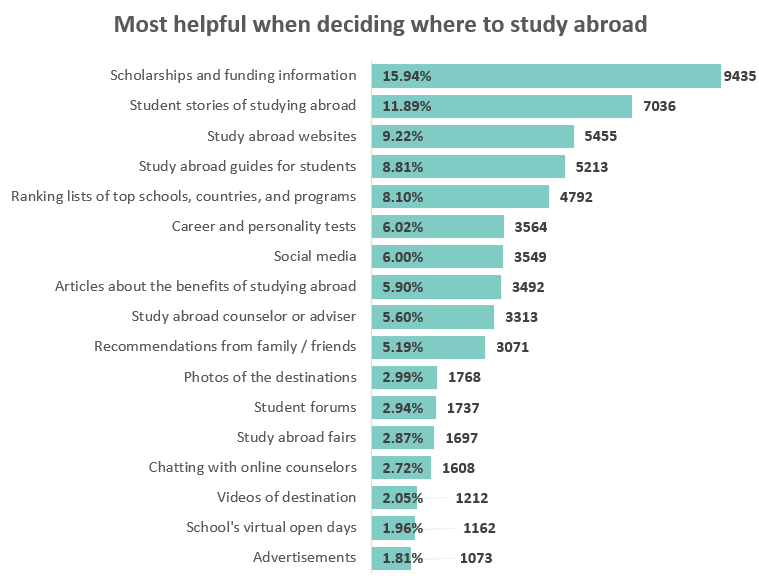
Stage 2: What should I study abroad?
Prospective students tend to consider unique program offerings first before looking at country and university choice, according to educations.com’s survey.
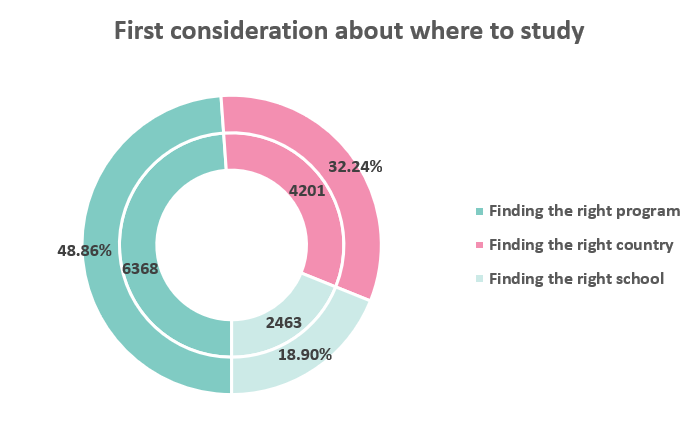
It is therefore essential for universities and schools to understand what is important to students in a study program abroad. Our survey shows that the top 3 factors selected by prospective students are:
-
Teaching quality / good professors
-
Affordable tuition fees
-
Work placement / internship opportunities
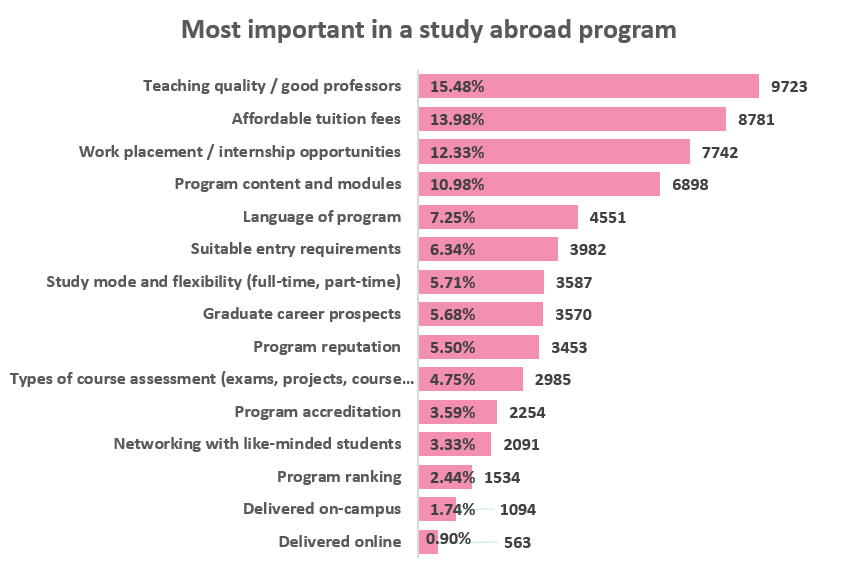
Marketing insights for recruiters💡
➡️ Ensure your website showcases excellent program content. Highlight the key features that are most important to your prospective students.
➡️ Use online education portals such as educations.com. Gen Z and millennial students are digital natives who are adept at using online resources to search and compare information. Education search engines offer students a convenient way to find and compare programs from universities around the world. Online education portals are your invaluable marketing allies that offer multiple touchpoints throughout your student recruitment process. Learn more about why you should use an education portal for student recruitment here.
We at educations.com can help you with your international student recruitment! Contact us to learn more.
Stage 3: Where should I study abroad?
Country choice is prospective students’ second consideration after program offering, as highlighted in educations.com’s survey.
Prospective students take into consideration a wide range of factors when deciding on a study abroad country. Key factors include:
-
Living costs
-
Language & culture
-
Safety & socio-political climate
Higher education institutions should analyze what are most important to prospective students so that you can highlight the advantages of studying in the country in which your institution is located.
You can also try and bridge the gaps in the country's offerings. For example, post-study employment opportunities is one of the top 5 considerations that determines prospective students’ country choice. If students can’t currently work in the country after graduation, you can work with other higher education institutions to make the case to your government about the importance of a post-study employment route.
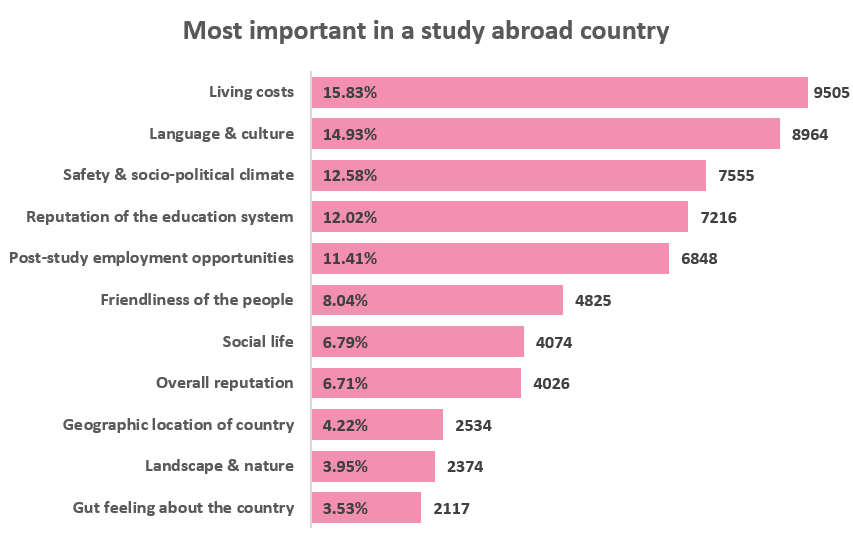
Our survey shows that for respondents who intend to study in English, the 5 most popular countries are:
-
United Kingdom
-
United States
-
Canada
-
Australia
-
Germany
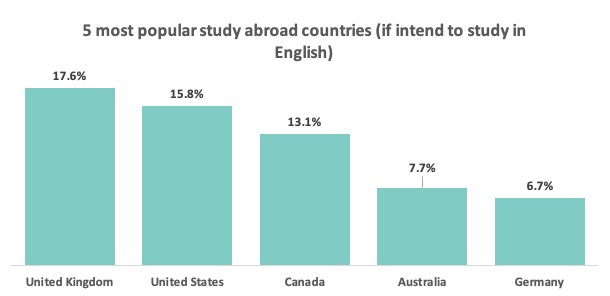
While it is important to know which countries are most popular with your target recruitment market, university recruiters should attempt to develop a deep understanding of their target sending countries as you might be able to identify lesser known market opportunities. For instance, Malaysian students are less likely to limit themselves by country due to their diverse cultural backgrounds. In our analysis, we discuss how this presents opportunities for universities from less well-known countries.
Marketing insights for recruiters💡
➡️ Sponsor country guides so that your institution is prominently associated with the country of interest.
➡️ Implement location-driven marketing that allows you to tailor your offerings to prospective students from different sending countries.
➡️ Work with agents who have expert knowledge of the target sending country.
➡️ Invest in a retargeting advertising campaign on educations.com based on countries of interest.
Stage 4: What’s most important to me when studying abroad?
In this information gathering stage, students’ top concerns and wishes will dominate which direction they take.
educations.com’s survey finds that finances is the top concern for prospective students when it comes to studying abroad. “Tuition fees and living expenses” is by far what students worry about the most.
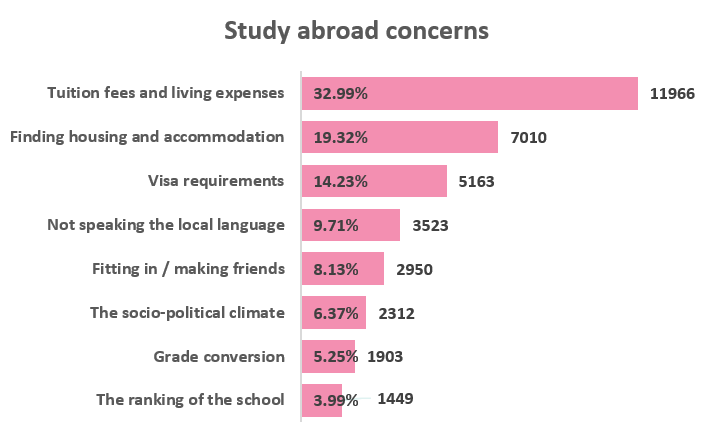
This explains the finding that “scholarships and funding information” is the most helpful factor for students deciding where to study abroad.
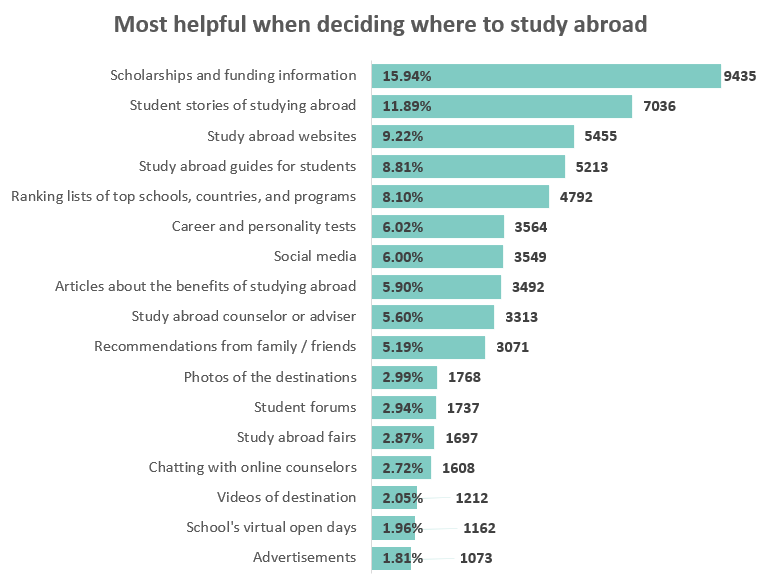
Marketing insights for recruiters💡
➡️ Promoting scholarships will be really useful during this stage. Highlight part-time student job opportunities, if available. These would help assuage students’ concern about finances.
➡️ Develop a thorough knowledge of students’ motivators and pain points in your student personas. This will help you understand how you can use your unique selling points to address prospective students’ goals and concerns. You can download our free undergraduate and postgraduate persona templates to help you create personas for prospective international students.

PHASE II. COMPARISON: 6 Months to 2 Years or More Before Start Date
At the comparison phase, prospective students will start to shortlist the schools and universities they are interested in. This is a crucial time for universities! It is important for recruiters to strategize to stand out from the crowd, and cement your institution’s brand.
By now, students would have likely decided on the program they want to study as well as the country they want to study in. This is supported by educations.com’s survey finding that prospective students tend to choose the school after deciding on the program and country of interest.
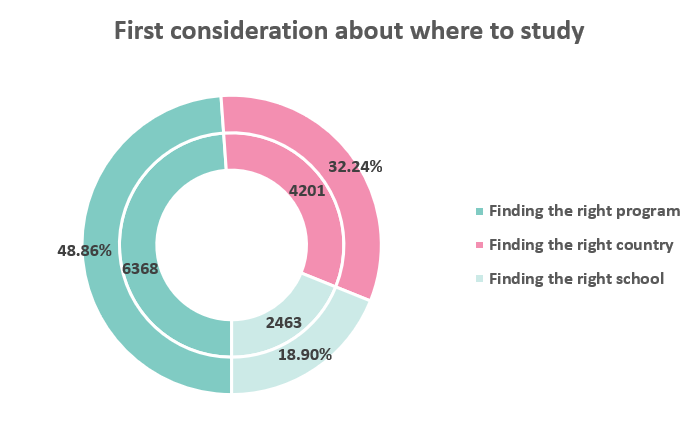
Stage 5: Why are these universities better options for me than others?
At this stage, students would consider the pros and cons of each university. They would then decide on the universities that they think can best meet their international education goals.
Knowing what drives students to choose certain schools or universities would help universities tailor your marketing plan.
education.com’s survey finds that “teaching quality” is by far the most important factor that determines university choice. Other key factors include:
-
General reputation of the school
-
Career services and industry connections
-
School offers accommodation and housing
-
Campus facilities (e.g. library, gym)
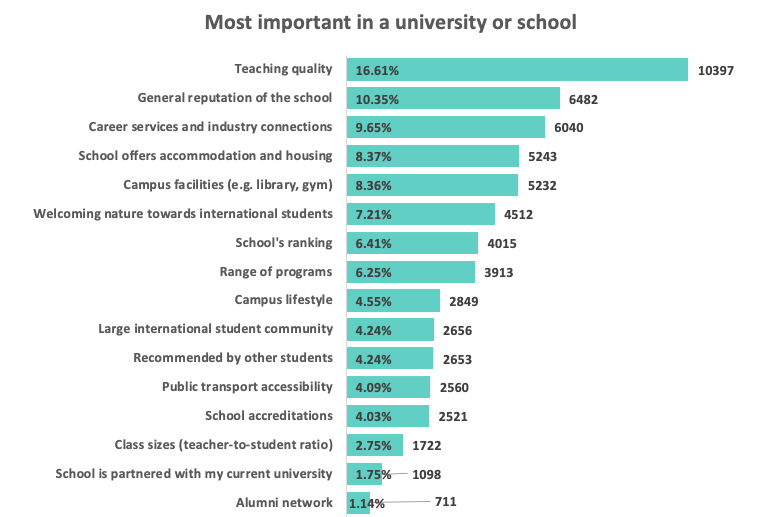
Marketing insights for recruiters💡
➡️ Use online education portals such as educations.com. This is a prime stage to leverage on education portals’ global reach and brand exposure to reach students from all over the world. You can easily track the success of your marketing campaigns with online education portals.
➡️ Develop a retargeting and remarketing plan. Many education portals offer enhanced tracking services that allow universities to remarket to high potential students.
➡️ Virtual fairs. Generate and nurture high quality international student leads by engaging proactively with prospective students in virtual fairs. Learn what students want from virtual fairs here.
Want to find out how we at educations.com can help you with your international student recruitment? Contact us today to learn more.
Stage 6: What criteria do I need to meet to be admitted to my program choices?
One key thing that prospective students are concerned about is the likelihood of being offered a place on the course or program they have chosen.
At this stage, students would search for information on admission requirements to get a general idea on how likely it would be for them to be admitted to their program of interest.
By providing clear admissions information and offering resources to help students meet admissions requirements, universities can put themselves in an excellent position to qualify and nurture student leads.
Marketing insights for recruiters💡
➡️ Give clear information on admissions requirements and selection criteria.
➡️ Provide resources to help students meet selection criteria such as online interview tips and help with the booking of language proficiency tests.
➡️ Highlight great examples of successful applications to inspire prospective students.
Stage 7: How many schools should I apply to?
Around three-quarters of respondents intend to apply to 3 or more different schools or universities, according to educations.com’s survey.
Applying to more schools will increase the chances of the students being accepted into a study abroad program. It will also provide back-up options for students in case they aren’t offered a place on their first-choice program.
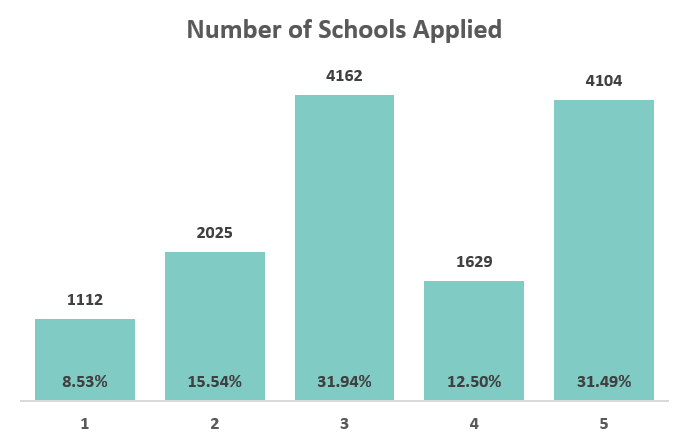
Marketing insights for recruiters💡
➡️ Make sure to mention that students tend to apply to at least a few different schools. Highlight the benefit of applying to a few different universities, that is, students have a higher chance of getting into a desired study abroad program.
➡️ This is a great time to keep pushing your brand awareness to ensure you are one of the natural final choices for prospective students.

PHASE III. APPLICATION: Up to 2 Years Before Application Deadline to Application Deadline
The application process is one of the longer and more involved phases for students on the international student journey prior to the studies phase.
At this phase, students would start gathering the required documents for their application packages. This could start as early as 1 to 2 years before the application deadline.
Students should know by now - through the clear admissions information provided by universities - the admissions requirements and selection criteria. They would also know the gaps they need to bridge to meet the admissions requirements.
Universities and schools can easily impress your applicants by providing comprehensive support throughout the application process!
Stage 8: What information do I need to prepare my application package?
Document requirements and timelines are two main pieces of information applicants need in order to prepare their application packages.
Application timelines vary greatly depending on programs, schools and countries. For some programs, application rounds can open a year before the intake date. Meeting deadlines is key to ensuring a successful admissions process. Universities should ensure that your applicants are aware of all the important dates for the admissions application.
Students will find that some documents take longer to prepare than others. They may need to submit requests or take tests to obtain some of the documents.
Marketing insights for recruiters💡
➡️ Provide a detailed checklist of required documents, resources on how to obtain the documents, and suggested interim timelines for the gathering of each document. This can help applicants plan their timeline accordingly.
➡️ Offer students the resources to book language proficiency tests or entrance tests if required.
➡️ If applicants have entered your customer relationship management (CRM) system at this point, provide an approachable navigation route to enrolling. Ideal features include save-as-you-go and abandoned cart options.
Stage 9: Who can answer questions during the application process?
It is essential for universities to have the resources to answer students’ questions during the application process. According to educations.com’s survey, a school that doesn’t respond to students’ questions is one of the top 5 reasons that might stop prospective students from applying to the school.
Universities should invest in the resources to provide personalized responses rather than automated general responses. This is because a large majority of students (86%) expect to receive specific answers to their questions rather than a general response with links to information on the school’s website.
This is an excellent place to distinguish yourself from your competitors by creating a supportive application experience.
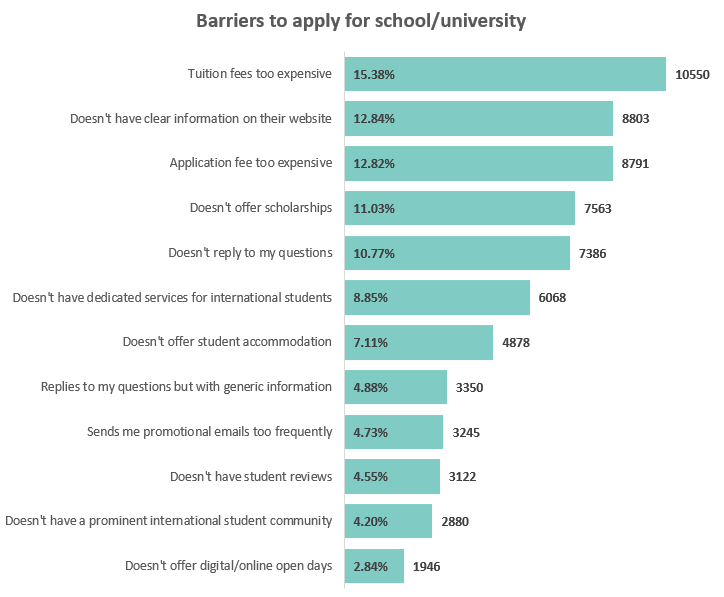
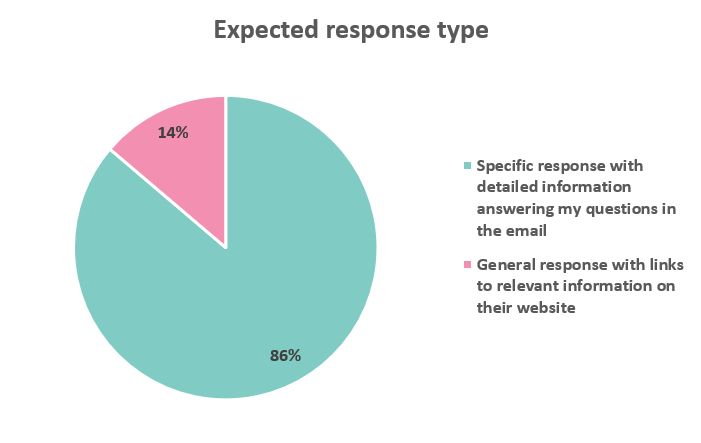
Marketing insights for recruiters💡
➡️ Put in place the necessary resources and processes to respond to students’ questions via email within 1 to 3 days. Email is the preferred means of communication for more than 70% of prospective students. Further, more than 50% of students expect to receive a response within 1 to 3 days, according to educations.com’s survey.
➡️ Value-added services you can consider providing are dedicated student counselors and live Q&A sessions.
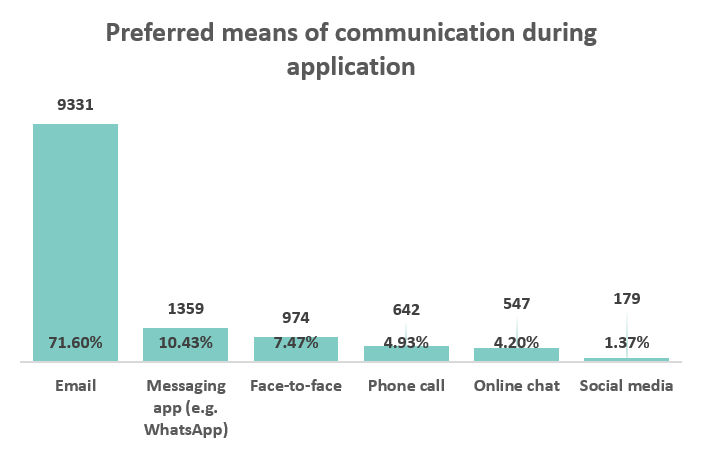
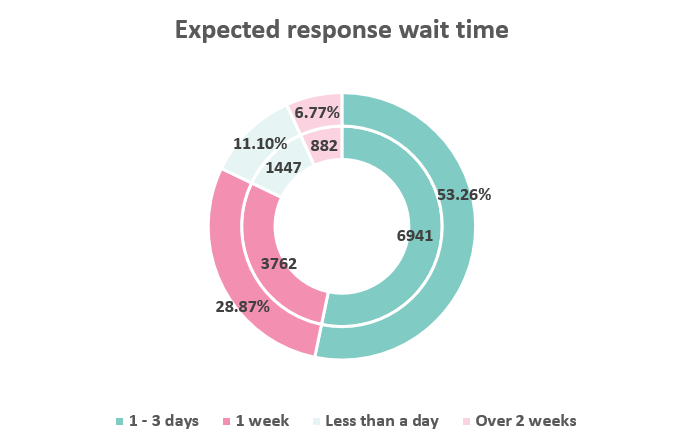

PHASE IV. ACCEPTANCE: 5 - 6 Months Before Start Date
For universities notifying applicants of your admissions results, bear in mind that this can be a highly emotional time for your applicants. Demonstrate your enthusiasm for all applicants who have gone from expressing an interest in your university to doing the work of applying for places on your programs.
Congratulate your successful applicants on their achievements! You should also encourage applicants who aren’t successful this time - competition for places on many programs can be very high. Also, just because the applicant is not a right fit now, it doesn’t mean they won’t be in the future.
Stage 10: Which school’s offer should I accept?
Universities will typically publish or notify applicants of the admissions results a few months after the application deadline. Applicants who receive multiple offers will usually have a few weeks to reply to the offers.
For some programs and countries, acceptance by the applicants’ first-choice school entails an automatic acceptance of the offer by the applicant, that is, no replies are required.
Some scholarship decisions are announced at the same time as the admissions results. This may sway some students towards programs that offer them scholarships, given that cost is the top concern for many prospective students when it comes to studying abroad.
Keeping in mind those applicants who are deciding whether to accept or decline your offer, university marketers should stage a final branding push at this phase. It is a good time to revisit students’ top reasons for studying abroad, as well as key motivators that determine students’ university and program choice - all of which can be obtained from educations.com’s survey.
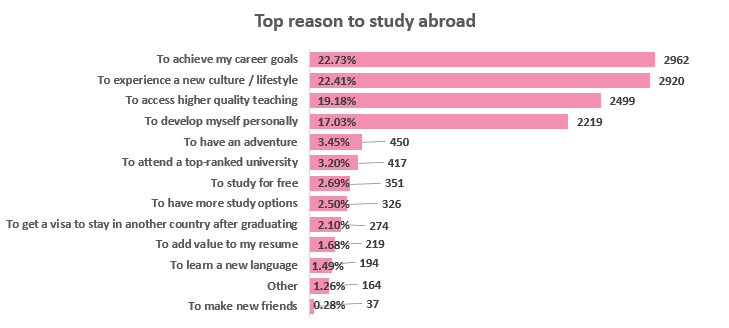

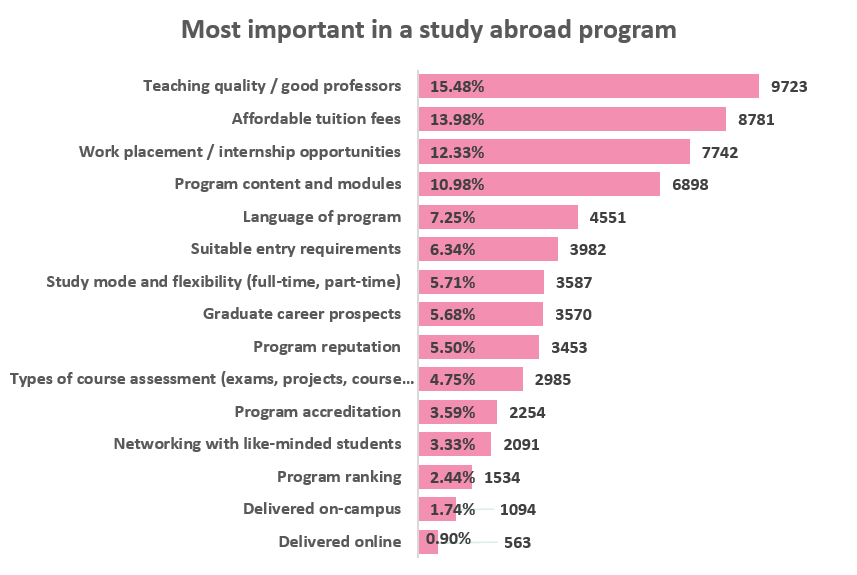
Marketing insights for recruiters💡
➡️ Highlight your unique selling points to help successful applicants decide on your school.
➡️ Using the information you have collected from your applicants in your customer relationship management (CRM) system, segment research data such as provided by educations.com’s survey and tailor your unique selling points accordingly.
➡️ Share the enthusiasm from your recently accepted students on social media platforms.
➡️ Don’t be afraid to spend time and resources on personal interactions to improve your acceptance-to-admission rate. Depending on the size of your incoming class, many institutions will send hand-written notes or provide other personal touches.
➡️ Showcase the most attractive peer-to-peer experiences.
➡️ Use email remarketing to achieve better acceptance rates through personalized email marketing campaigns.
Contact us today to learn how we at educations.com can help with your international student recruitment!

PHASE V. ENROLLMENT: 5 - 6 Months Before Start Date
Great news for universities and schools! Your prospective students turned successful applicants have decided to accept your offer!
While the role of university recruiters has ended at this phase once the applicants have accepted your offer, universities and schools should continue to drive initiatives that grow your engagement with your students. This can help your students have an unforgettable study abroad experience, which in turn can help develop them into powerful alumni advocates.
This is an exciting time for your international students as they make the logistical arrangements to study abroad. This can however also be an overwhelming process especially for students who have never studied or lived overseas.
Universities would shine by supporting your students and making their preparations for the move feel as effortless as possible!
The stages in the enrollment phase cover the main areas of pre-arrival preparations and are not in fixed order.
Stage 11: What steps do I need to take to secure a visa?
Every country would have its own visa requirements for international students. Depending on the students’ country of origin, they may need to apply for a visa. Visa requirements usually include the following:
-
have a valid passport
-
have been admitted to higher education studies in the country
-
have sufficient funds to support themselves
-
have a comprehensive health insurance
Engagement insights for higher education institutions💡
➡️ Universities can make it easier for students to understand the requirements to get a visa. For instance, higher education institutions can provide translations of the requirements if the requirements have not been translated into the students’ languages.
➡️ Consider establishing a dedicated international students’ office that can respond in a timely manner to students’ questions about all aspects of their pre-arrival preparations including visa requirements.
Stage 12: How do I get there?
Depending on how far international students need to travel, they may have a variety of travel options to get from their home country to the study abroad country. They would research and compare their travel options.
They would also need to consider what to pack, how much to bring and how to transport or send their luggage.
Universities can help by offering relevant travel guidance.
Engagement insights for higher education institutions💡
➡️ Provide information on the main transport hubs near your school such as the main airport or train station and how to get to your school from those hubs.
➡️ Provide value-added support by arranging common pick-up days from main transport hubs. For instance, if students can aim to get to a designated airport on certain days between certain times, universities can arrange for a complimentary shuttle to take students to their campus or accommodation.
➡️ It would also be useful if schools can provide information on any discounted travel for students, travel safety tips, packing checklists and other features to help support students.
Stage 13: Where will I stay?
Some international students may be fortunate enough to be able to arrange their accommodation through their programs or schools. Others would have to secure their own housing.
Most students (77%) are keen to organize their accommodation before they arrive in the study abroad country, according to educations.com’s survey. However, around two-thirds of students have no idea how to go about organizing accommodation.
This indicates that students who need to secure their own accommodation would require a lot of guidance from the university. This is because they aren’t likely to be familiar with the local housing conditions and they could face language barriers.
Universities and schools can leverage on your extensive local knowledge to provide relevant and helpful support for their students who have to find their own accommodation.
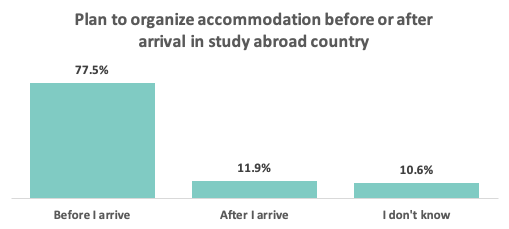
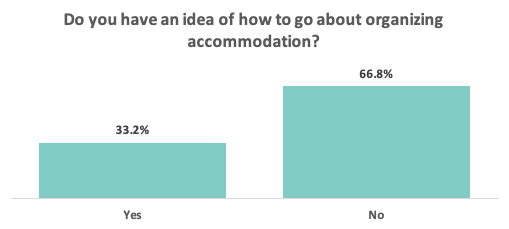
Engagement insights for higher education institutions💡
➡️ If your school offers on-campus housing options, provide detailed information on the accommodation and on how to secure the housing.
➡️ If the students need to arrange their own accommodation, provide as much information as possible on local housing options. This could include links to online student communities for flat-sharing, local rental advertisement sites and other location-specific guides. These guides are wonderful to make available on your public site so that prospective students can access it.
➡️ Ensure your international students’ office (or officers), if applicable, are on hand to help students with their accommodation queries. For instance, they may be able to help with the translation of rental agreements.
Stage 14: How will my budget work?
Students will be concerned about how to manage their money while studying abroad. Faced with a plethora of new experiences, some students may be tempted to blow their money with the justification of YOLO.
While it is true that you DO only live once, universities can encourage students to make the most of their study abroad experience while staying within their budget. Schools and universities can help by providing guidance on local living costs and budget tips.
Engagement insights for higher education institutions💡
➡️ Provide estimates of local living costs for main items such as rent, transport, food and books.
➡️ Compile budget tips to help students save money while studying abroad:
-
Bring student ID everywhere - get student discounts on travel, museums, restaurants and shops.
-
Make meals at home - tend to be far cheaper than eating out.
-
Find free things to do - check out beaches, go hiking, do outdoor activities and visit free museums and festivals.
-
Opt for the cheaper way to travel - e.g. walk and cycle instead of taking the bus where possible.
➡️ Develop avenues for peer-to-peer information-sharing such as on how to make the most of students’ budgets.

PHASE VI. ARRIVAL: 1 - 4 Weeks Before Start Date
Get ready to welcome your new students! Schools and universities can arrange a range of orientation activities to introduce your school and city to new students and ease them into their student life.
This orientation period is a great opportunity to capture student enthusiasm and inspire your next round of applicants!
Stage 15: How can I successfully move into my host country and university?
New students are likely to be both excited and nervous about arriving at a new country, making new friends and beginning their study abroad adventure.
Universities can make the most of the period before studies begin to welcome new students and make them feel excited to be a part of your institution.
Engagement insights for higher education institutions💡
➡️ Develop an extensive welcome plan for new students. This may begin with complimentary pick-ups at the main airport or train stations. You can recruit both staff and students to be part of the welcoming party.
➡️ Offer guided tours of the city and surrounding areas to familiarize students with their new city / town.
➡️ Document these experiences, and consider live-streaming in order to leverage these student experiences for prospective students.
➡️ If local residents speak different languages to the ones that the international students are proficient in, offer free language classes to help them communicate better with the locals.
➡️ Arrange a buddy system where current students can offer personal guidance to new students.
➡️ Work with student associations to organize orientation activities.

PHASE VII. STUDIES
For international students, the studies phase is the major phase in which they will attempt to meet their learning goals.
The students’ main interaction during this phase with the university would be with the institution’s faculty rather than with the university marketers. Nevertheless, it is essential for marketers to stay engaged with your international students during this phase. You will be able to obtain invaluable information on the students’ experiences and learn from that to improve your recruitment campaign for new applicants.
Stage 16: How can I meet my goals and how does the institution meet my expectations?
During the studies period, students will be periodically evaluating whether they are meeting their study abroad goals, and if your school is meeting their expectations.
It is important for schools to capture information about your international students’ study experiences. This is so that you can evaluate how you can better set and meet their expectations. You can then also publicize the work that your institution is doing to enhance international students’ study experiences and attract the next rounds of applicants.
Engagement insights for higher education institutions💡
➡️ Develop formal channels such as research surveys to regularly assess whether your marketing campaign has set the right expectations for your students. Some of the questions you may focus on include:
-
Are your international students given the support they need?
-
Do they have a platform to voice concerns and share their student experiences?
-
Are internship experiences, or other opportunities that local students have accommodated for in the international experience?
➡️ Publicize the support and opportunities that your institution provides for international students, and use these to develop your unique selling points and marketing material.
Stage 17: How can I share this momentous experience with others?
International students who are studying abroad will be keen to share their experiences with their family and friends back home. They are likely to use social media to share their experiences given the ubiquity of social media across the world.
Engagement insights for higher education institutions💡
➡️ Universities can tap into millennial and Gen Z students’ digital savviness and recruit them to be bloggers or vloggers and essentially be student ambassadors on the university’s social media platforms.
➡️ Schools and universities can consider building your presence on different social media platforms. You can see which platforms are most popular in your main student recruitment markets and focus your resources on those platforms.

PHASE VIII. APPROACHING GRADUATION
Your international students are approaching graduation with a mixture of feelings. Hopefully, they’ve had a great time studying at your institution and are looking forward to taking the next step in their lives. However, they might also feel sad at the thought of leaving the friends they’ve made. In addition, they might also be stressed about passing their final exams as well as deciding on what to do next.
Supporting your graduates during this phase is crucial to securing a great international alumni network for your university. This will help boost your unique selling points for future applicants.
Stage 18: What will I do after graduation?
educations.com’s survey shows that international students plan to do various things after their graduation. Thirty five percent of respondents plan to return to their home country while a similar proportion (33%) plan to stay in the country where they’re studying abroad. Nine percent of respondents plan to move to a different country while the rest haven’t decided on where they will be or go next.
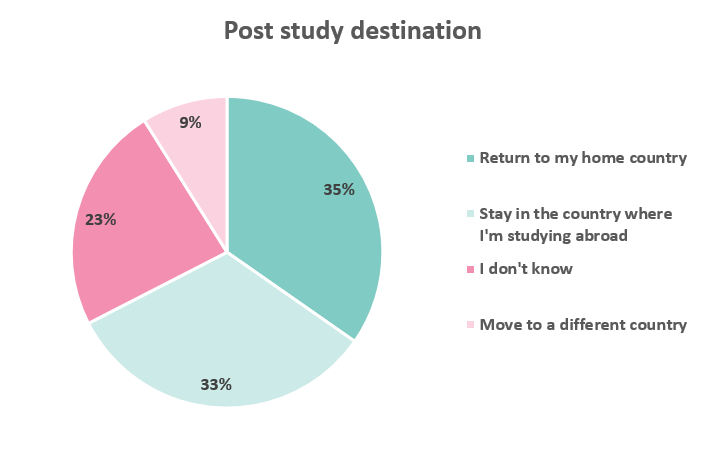
Meanwhile, nearly 60% of respondents plan to work while 17% would like to continue studying.
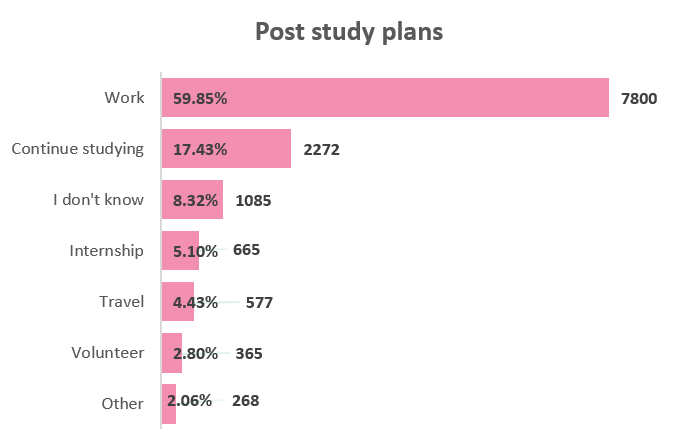
Engagement insights for higher education institutions💡
➡️ For your graduates who are planning to enter the job market, you can offer career guidance services such as career counseling and CV writing tips. If you have the expertise, you can tailor these services according to the country they wish to work in.
➡️ For graduates who wish to stay on in the country to look for jobs, you can provide information on visa requirements.
➡️ Consider offering your services (such as career services or library access) for a period of time after graduation to help your graduates take the next step in their careers or studies.

PHASE IX. ALUMNI ADVOCATES
Your international students have experienced an amazing study journey with your university. Build on your engagement with your international students and turn your alumni into passionate advocates for your school.
A mistake that many institutions make is to only engage with their alumni sporadically and/or treat their alumni only as potential donors.
Engaged alumni will be motivated to contribute their time, effort and network. This can benefit your university in various ways:
-
Increase student enrollment - word-of-mouth recommendations by your alumni are powerful endorsements in guiding prospective students’ decisions.
-
Widen career services access - alumni’s participation in the school’s career services will improve the professional network that students can take advantage of.
-
Improve student services - alumni bring a wealth of real-life experience to mentoring programs and can help broaden students’ horizons.
Stage 19: How can I promote my school?
A study abroad experience could turn out to be one of the most formative experiences for your international students. The affinity that your alumni feel for their alma mater would transform your institution into “their” school.
Higher education institutions will do well to harness your alumni’s affection for your school and translate that into active alumni engagement, participation and advocacy.
Engagement insights for higher education institutions💡
➡️ Know your audience. Create alumni personas that take into account your alumni’s interests and affinities such as the study program they attended, their membership in clubs and societies, their current location and the current industry in which they work.
➡️ Segment your audience and personalize the message. Target the groups who will be most receptive to your particular message.
➡️ Identify the value proposition for your alumni personas. People value different things so be sure to offer a range of benefits. These could include granting access to certain university events, recruiting the most active alumni to be alumni community leaders, and creating a sense of belonging with active participation in alumni events.
➡️ Consider setting up a dedicated alumni marketing platform. This can be tied to a virtual community or online forums that invite graduates to connect with each other as well as with university marketers. Universities can use this platform to market events and messages that interest your alumni and encourage them to greater advocacy.
We at educations.com can help you overcome student recruitment challenges and reach your goals. Contact us to learn more.






%20-%202.png)

